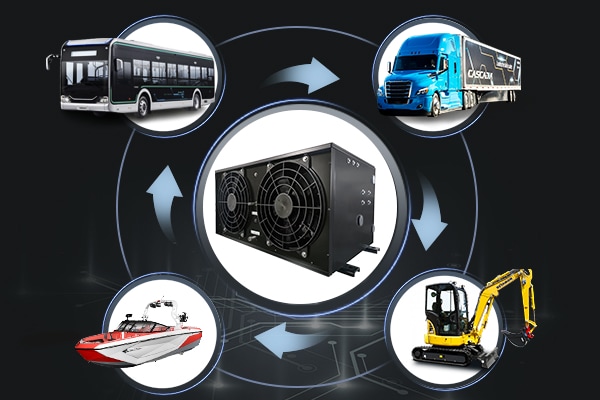Innovations in Battery Thermal Management
In the context of the continuous transformation of the global energy structure and the growing social consensus on the concept of sustainable development, the application of clean energy has become the core driving force for social progress.
그러므로, the research and development and application of efficient heat dissipation technology is particularly important, which is not only directly related to the stable operation of clean energy equipment, but also the key to enhancing energy utilization efficiency and promoting green development.

TKT HVAC battery liquid cooling management technology has demonstrated its great application value in many fields due to its high efficiency of heat dissipation, excellent stability, and wide adaptability.
Battery liquid cooling technology, as a major innovation in the field of battery thermal management, provides a strong guarantee for the efficient and stable operation of batteries.
Through a well-designed liquid cooling system, the technology utilizes circulating coolant to efficiently absorb and carry away the heat accumulated inside the battery, thus ensuring that the battery operates within the optimal temperature range.
In a nutshell, the coolant flows through a network of microscopic tubes that are finely arranged inside the battery, precisely removing heat like blood vessels, and then radiating the heat to the environment through an external radiator.
Compared with traditional fans or heat sinks, this refined thermal management method not only significantly improves cooling efficiency, but also achieves a more uniform cooling effect, effectively avoiding localized overheating.
Battery liquid cooling system technology has a wide range of applications, especially in the new energy automotive industry plays a pivotal role.
전기 자동차의 경우, lithium-ion batteries and other core power components are widely used in liquid cooling technology, which significantly improves the charging and discharging efficiency of the battery, extends the service life of the battery, and significantly shortens the charging time.
게다가, liquid cooling technology can effectively cope with extreme temperature environments and maintain stable battery performance, thus ensuring the safe operation of new energy vehicles under various conditions.
In a wide range of practical applications, TKT’s battery liquid cooling system technology has become a powerful assistant for new energy vehicles and energy storage systems.
Through close integration with advanced battery management technologies, this technology not only significantly improves the safety and reliability of battery systems. But also provides efficient and stable energy security for key applications such as electric vehicles and energy storage power stations, ensuring their continuous and stable operation.

Types of Battery Liquid Cooling Technology
With the rapid development of technology, TKT’s battery liquid cooling technology is expected to be more widely promoted and applied in the future.
Battery liquid cooling technology can be mainly categorized into two types: direct contact liquid cooling and indirect contact liquid cooling.
1. direct contact liquid cooling technology is a highly efficient thermal management technology, which realizes rapid heat transfer and exchange by directly contacting the coolant with the battery.
This technology significantly improves the heat dissipation efficiency of the battery, effectively reduces the battery temperature, and ensures its stable operation. 하지만, since the coolant directly contacts the battery, the choice of cooling medium puts forward very high requirements.
Under safety considerations, fluids with excellent insulation properties and high thermal conductivity, such as mineral oil, silicone-based oil, 등., need to be selected. 하지만, the higher viscosity of such fluids may have a certain impact on the overall performance of the cooling system.
2. In indirect contact liquid cooling technology through the establishment of a heat exchange interface between the battery and the liquid cooling plate and other components. The heat generated by the battery is indirectly transferred to the liquid cooling plate. And then the coolant and the liquid cooling plate for heat exchange.
This approach avoids direct contact between the battery and the coolant, greatly reducing the risk of short-circuiting the battery due to coolant leakage. Indirect contact liquid cooling technology usually uses water, ethylene glycol. And other mediums with excellent thermal conductivity and high safety as the cooling medium to ensure the efficient operation and safety of the system.
Whether direct or indirect contact, TKT’s battery liquid cooling system technology is dedicated to achieving the optimal operating temperature environment for the battery, significantly improving its performance and extending its service life.
As battery technology advances, TKT EV Solution continues to innovate and optimize its liquid cooling technology to meet the demands of higher energy densities and more stringent safety standards.



